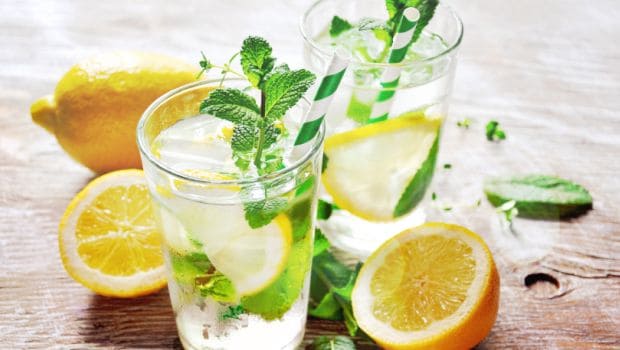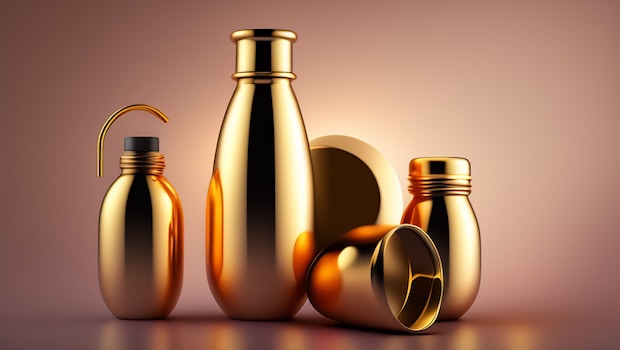Copperware looks gorgeous. That hammered rose-gold sheen, and those earthy curves of the utensils glam up your kitchen and make it feel luxe. But for many Indian homes, it is more than an aesthetic addition. Copper utensils have been a part of Indian culture for centuries, revered in Ayurveda and passed down through generations. Sipping tamra jal (copper-infused water) at sunrise is a traditional morning ritual that is believed to help balance doshas and boost digestion. So, it is no surprise that the copper bottle trend has made a full comeback in today's health-conscious world. But somewhere between tradition and modern health hacks, things got a little muddled. Some people started adding lemon to their copper water, hoping to speed up the detox process. Except, that is where things started going off track.
Turns out, mixing lemon and copper is a potentially harmful habit. And what looks like wellness on the
urface can actually trigger reactions you definitely do not want in your morning ritual. Here is why lemon water and copper vessels do not go hand-in-hand.
Also Read: Copper Water For Diabetes: Does Drinking Water From Copper Vessel Help Regulate Blood Sugar?
What Happens When Lemon Juice Reacts With Copper?
Lemon juice and copper can trigger a toxic chemical reaction. Lemon juice contains citric acid, which is highly reactive with metals like copper. When lemon water is stored in a copper vessel, the acid reacts with the copper to form copper salts. These salts then dissolve into the water, altering both its taste and its composition.
According to research by the American Chemical Society, copper readily undergoes redox reactions when exposed to acids, forming compounds such as copper nitrate or copper citrate depending on the acid involved. These reactions lead to copper leaching - and that directly impacts your health.

Photo Credit: Pexels
Is It Safe To Drink Lemon Water In Copper Bottles?
According to the World Health Organisation (WHO), copper levels should be limited to 2 mg/litre in drinking water to avoid health risks. A study published in the journal Applied Water Science evaluated copper concentrations in water stored in copper containers. It found that copper levels ranged from 0.009 to 0.823 mg/litre, depending on duration and acidity. While these levels may remain within permissible limits for plain water, the presence of acid accelerates copper leaching, increasing the risk of copper toxicity.
Another study, published in the journal Food Science Nutrition, highlights that excessive copper intake can lead to:
- Gastrointestinal distress
- Liver damage
- Neurological symptoms
Ayurvedic expert Dr Poorvi Bhat explains that tamra jal is packed with antimicrobial and detoxifying properties and should be prepared by storing plain water in copper overnight. "It should be consumed first thing in the morning. Acidic substances like lemon juice, tamarind, and vinegar are strictly prohibited in copper vessels as the acidic reaction disrupts the body's internal balance," she adds. This can further lead to the formation of ama (toxins), which interfere with digestion and immunity.
Also Read: 7 Recipes To Reinvent Plain Nimbu Pani To Make Interesting Drinks

Photo Credit: iStock
Why You Should Only Use Lemon To Clean Copper, Not Drink From It?
Interestingly, lemon is often used to clean tarnished copper vessels. Its citric acid dissolves oxidation stains and restores shine. But this same acid, when ingested after reacting with copper, can be harmful. So, while lemon is great for polishing copper, it should never be consumed from it.
Step-By-Step: How To Clean Copper Vessels Using Lemon Juice:
Step 1. Cut the lemon in half and sprinkle salt generously on the cut side.
Step 2. Rub the salted lemon directly onto the tarnished copper surface using circular motions. The citric acid breaks down oxidation, while the salt acts as a gentle abrasive.
Step 3. For stubborn tarnish, let the lemon juice sit on the surface for 5-10 minutes before scrubbing again.
Step 4. Wash the copper item with warm water to remove any residue.
Step 5. Use a soft cloth to dry the utensil completely. Avoid air-drying - it may form water spots.

\Photo Credit: Freepik
Final Thought: Keep Copper Water Plain And Lemon Water Separate
Wisdom lies not just in the ritual, but in how it is practised. So, the next time you reach for your copper bottle, make sure it is filled with plain water. And let your lemon water shine in stainless steel, ceramic or glass vessels.
About Somdatta SahaExplorer- this is what Somdatta likes to call herself. Be it in terms of food, people or places, all she craves for is to know the unknown. A simple aglio olio pasta or daal-chawal and a good movie can make her day.
